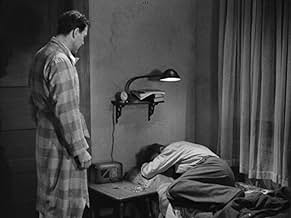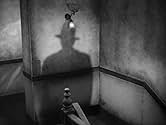Ajouter une intrigue dans votre langueTwo guys sharing an apartment meet twin girls (both Bonita Granville). One's sweet, the other a major piece of bad news. The nice one is murdered and her boyfriend is accused of the crime. T... Tout lireTwo guys sharing an apartment meet twin girls (both Bonita Granville). One's sweet, the other a major piece of bad news. The nice one is murdered and her boyfriend is accused of the crime. The wrong man/wrong victim plot strikes again.Two guys sharing an apartment meet twin girls (both Bonita Granville). One's sweet, the other a major piece of bad news. The nice one is murdered and her boyfriend is accused of the crime. The wrong man/wrong victim plot strikes again.
- Réalisation
- Scénario
- Casting principal
Carol Andrews
- Girl Whistler
- (as Caroline Andrews)
Mike Donovan
- Policeman
- (non crédité)
Franklyn Farnum
- Officer O'Brien
- (non crédité)
Charles Sherlock
- Policeman
- (non crédité)
Avis à la une
Army buddies Mike Carr and Johnny Dixon are roommates after the war. They get involved with twins Linda and Estelle Mitchell (Bonita Granville). When Linda dies, suspicion falls on Johnny who was dating her. Alex Tremholt is the fatherly longtime renter at the Mitchell home. Detective Heller investigates. In the present time, Mike is narrating the story while discussing it with a bartender.
This has classic noir construction. One twin is good and the other is bad. It's a B-movie. It's stripped down. The actors are functional. Bonita Granville is doing both twins. They could differentiate the twins a bit more. I wonder if they should put on a wig for one of them. It's not the best acting nor the worst. There is some big over-acting. It has overwrought noir style although the camera work is mostly perfunctory. The story has plenty of turns which functions well and I like the final twist which is meant to overturn the audience's expectations. The filmmaker is able to execute this classic twist by underplaying him. It's well done.
This has classic noir construction. One twin is good and the other is bad. It's a B-movie. It's stripped down. The actors are functional. Bonita Granville is doing both twins. They could differentiate the twins a bit more. I wonder if they should put on a wig for one of them. It's not the best acting nor the worst. There is some big over-acting. It has overwrought noir style although the camera work is mostly perfunctory. The story has plenty of turns which functions well and I like the final twist which is meant to overturn the audience's expectations. The filmmaker is able to execute this classic twist by underplaying him. It's well done.
In 1946, Olivia De Havilland donned monogram brooches and identity necklaces to take the dual role of good and bad twins Ruth and Terry in Robert Siodmak's The Dark Mirror. The following year Bonita Granville followed suit, as good and bad twins Linda and Estelle, in Monogram's sub-basement adaptation of a Cornell Woolrich story. Of the two, The Guilty is the creepier, more haunting movie, taking a place of dubious honor amid the nether reaches of film noir.
Mustachioed Don Castle shares his walk-up flat with his superior from army days, Wally Cassel, who's a little unstable owing to a head injury sustained in combat. They're involved in a complicated foursome with the twins; when one of the fellows breaks up with one of the girls, the other takes up with the ditched sister. But the insanely jealous Estelle keeps playing one guy off the other; she wants both and her sister to have neither. One night Linda disappears; later her body is found on a rooftop, in a barrel of gravel (she was too big to shove down the incinerator shaft). Police investigator Regis Toomey encounters a baffling maze of alibis and false clues (Castle is on the hunt as well), until the movie ends with climaxes within climaxes.
All this takes place in but three sleazy sets: The men's apartment; that of the twins, their mother and a long-time boarder (John Litel); and a corner bar from which most of the story is narrated in flashback. A few forays into the dark, deserted streets only enhance the claustrophobia, the obsessiveness of Woolrich's nightmare vision. (And his obsessive fiction reuses the same themes and gambits over and over; there are parallels here to the same year's The Fall Guy, which resembles The Black Angel, which...).
Granville, of course, will ever be the screen embodiment of Nancy Drew, from the four programmers she starred in as the teenaged sleuth during the late '30s. Her career started to sputter in the next decade; for one thing her girlish exuberance didn't blossom into womanly glamor. But she developed a tough, no-nonsense, very-'40s face (not unlike Ann Savage's). Her noir appearances were limited to a small (but meaty) role in The Glass Key and a leading one in the low-budget Suspense. It's a shame, because grew up into quite a good bad girl.
Mustachioed Don Castle shares his walk-up flat with his superior from army days, Wally Cassel, who's a little unstable owing to a head injury sustained in combat. They're involved in a complicated foursome with the twins; when one of the fellows breaks up with one of the girls, the other takes up with the ditched sister. But the insanely jealous Estelle keeps playing one guy off the other; she wants both and her sister to have neither. One night Linda disappears; later her body is found on a rooftop, in a barrel of gravel (she was too big to shove down the incinerator shaft). Police investigator Regis Toomey encounters a baffling maze of alibis and false clues (Castle is on the hunt as well), until the movie ends with climaxes within climaxes.
All this takes place in but three sleazy sets: The men's apartment; that of the twins, their mother and a long-time boarder (John Litel); and a corner bar from which most of the story is narrated in flashback. A few forays into the dark, deserted streets only enhance the claustrophobia, the obsessiveness of Woolrich's nightmare vision. (And his obsessive fiction reuses the same themes and gambits over and over; there are parallels here to the same year's The Fall Guy, which resembles The Black Angel, which...).
Granville, of course, will ever be the screen embodiment of Nancy Drew, from the four programmers she starred in as the teenaged sleuth during the late '30s. Her career started to sputter in the next decade; for one thing her girlish exuberance didn't blossom into womanly glamor. But she developed a tough, no-nonsense, very-'40s face (not unlike Ann Savage's). Her noir appearances were limited to a small (but meaty) role in The Glass Key and a leading one in the low-budget Suspense. It's a shame, because grew up into quite a good bad girl.
Both somewhat dull and weirdly fascinating, the flick starts with a long voiceover and lengthier flashback to explain how two army buddies, later roommates, (one incapacitated by PTSD, the other attending night school to better himself) get mixed up with a pair of twin sisters of opposite character (Bonita Granville). When one of them suddenly disappears, the investigation begins. Don Castle plays the straight upstanding veteran beside Wally Cassell's nervous wreck, and the two find ways to ward off a cloud of suspicion over their possible involvement in the disappearance. This is a rough-and-ready B movie but all the more authentic for that. Shot entirely in the gloom of night, it's dreary, rain-soaked and confined to about three locations - but the strange relationship between the ex-soldiers and the twins keeps one engaged, as does the whodunnit aspect, which turns out to be overly convoluted. A palpable sense of ennui, existential angst and cynicism runs through the film which, with some excellent use of shadow and light, elevate this low-budget Monogram movie into something very watchable. There's plenty to like here.
(1947) The Guilty
MYSTERY CRIME DRAMA
Adapted from Cornell Woolrich short story "Two Men in a Furnished Room" from "Detective Fiction Weekly" with the narrator Mike Carr (Don Castle) narrating both the story and the events when one of the 2 twin sisters (Linda to be exact), both played by Bonita Granville is murdered all pointing to her spouse, Johnny Dixon (Wally Cassell)as the guilty suspect evading the police. And of course, the surviving twin, Estelle Mitchell helps Mike Carr since him and Johnny used to serve one another get involve into uncovering the murder. A moderate entertaining thriller that keeps viewers guessing until the very end.
Adapted from Cornell Woolrich short story "Two Men in a Furnished Room" from "Detective Fiction Weekly" with the narrator Mike Carr (Don Castle) narrating both the story and the events when one of the 2 twin sisters (Linda to be exact), both played by Bonita Granville is murdered all pointing to her spouse, Johnny Dixon (Wally Cassell)as the guilty suspect evading the police. And of course, the surviving twin, Estelle Mitchell helps Mike Carr since him and Johnny used to serve one another get involve into uncovering the murder. A moderate entertaining thriller that keeps viewers guessing until the very end.
Another good film about twins from 1947 – the other being "Dual Alibi" starring Herbert Lom. In this offering, Bonita Granville plays both the good and the bad sister. One of them is murdered and it's up to Inspector Regis Toomey to get to the truth. Ex-soldier Don Castle (Mike) also does some investigating of his own.
There is a small cast in this offering and so you may suspect the guilty party at some point. However, this story is clever and does provide you with extra twists and turns at the end. The film is short and basically, it fooled me.
Twins always seem to be trouble whenever they pop up in films!
There is a small cast in this offering and so you may suspect the guilty party at some point. However, this story is clever and does provide you with extra twists and turns at the end. The film is short and basically, it fooled me.
Twins always seem to be trouble whenever they pop up in films!
Le saviez-vous
- AnecdotesThe score was written by Rudy Schrager, an immensely talented composer who's been all but forgotten. (His Gunsmoke (1955) scores are required listening for any movie music fan.) When, after WWII, the union representing film composers prohibited them from writing TV music, Schrager and several other composers had some of their film scores re-orchestrated and recorded in Europe. Schrager, et al, could then be paid for their work when this "laundered" music was used in TV shows - one of which was Superman (1952).
- GaffesAfter knocking Dixon out, Carr revives him by throwing a glass of water in his face--and completely misses.
- Crédits fousDon Castle is given "Presenting" credit, which is normally a euphemism for "Introducing," even though he had some 30 credits going back to 1938.
- ConnexionsFeatured in Jack Wrather: A Legacy of Film and Friendship (2022)
Meilleurs choix
Connectez-vous pour évaluer et suivre la liste de favoris afin de recevoir des recommandations personnalisées
- How long is The Guilty?Alimenté par Alexa
Détails
- Date de sortie
- Pays d’origine
- Sites officiels
- Langue
- Aussi connu sous le nom de
- Error fatal
- Sociétés de production
- Voir plus de crédits d'entreprise sur IMDbPro
Box-office
- Budget
- 120 000 $US (estimé)
- Durée
- 1h 11min(71 min)
- Couleur
- Mixage
- Rapport de forme
- 1.37 : 1
Contribuer à cette page
Suggérer une modification ou ajouter du contenu manquant



































